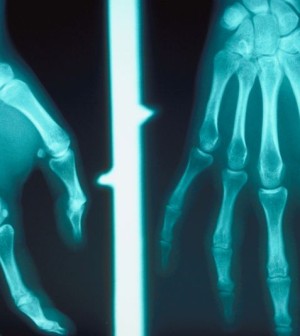- Could Your Grocery Store Meat Be Causing Recurring UTIs?
- Are You Making This Expensive Thermostat Error This Winter?
- Recognizing the Signs of Hypothyroidism
- 10 Strategies to Overcome Insomnia
- Could Artificial Sweeteners Be Aging the Brain Faster?
- Techniques for Soothing Your Nervous System
- Does the Water in Your House Smell Funny? Here’s Why
- Can a Daily Dose of Apple Cider Vinegar Actually Aid Weight Loss?
- 6 Health Beverages That Can Actually Spike Your Blood Sugar
- Treatment Options for Social Anxiety Disorder
Blood Thinners May Not Be Needed for Kids’ Back Surgery


Most children who have spinal surgery don’t require anti-clotting drugs because blood clots occur so rarely in these procedures, a new study says.
Instead of the risky and costly blood-thinning drugs, close monitoring after surgery is enough for most of these patients, according to the Johns Hopkins Children’s Center researchers.
Anti-clotting drugs should be considered only for young spinal surgery patients who are at increased risk for blood clots, the study authors said. These include those older than 18, kids with spinal curvatures present at birth, and those with spinal curvatures that are part of an overall condition and accompanied by other health problems that may interfere with normal blood clotting.
The researchers analyzed the outcomes of nearly 22,000 children across the United States who had spinal fusion surgery between 2001 and 2010. This is the most common type of spinal surgery in children and adults. It’s most frequently used to treat spinal fracture and curvature of the spine, the study authors said.
Overall, blood clots occurred in 21 of every 10,000 surgeries and no patients died because of a blood clot. Certain subgroups of patients were at higher risk for blood clots than others. The findings were published online July 15 in the journal Spine.
Clotting risk in children is poorly understood, resulting in a lack of treatment guidelines, the researchers noted.
“Our findings should help clinicians weigh the pros and cons of pre-emptive treatment and focus on those who stand to benefit the most,” senior investigator Dr. Paul Sponseller, chief of pediatric orthopedics, said in a Hopkins news release.
“Most children undergoing spine surgeries should be perfectly safe without medication. Treatment should be reserved for the handful of patients who have a real risk of developing dangerous clots,” he said. “In these patients, the benefits of treatment far outweigh the risks.”
More information
The U.S. National Library of Medicine has more about spinal fusion.
Source: HealthDay
Copyright © 2026 HealthDay. All rights reserved.










